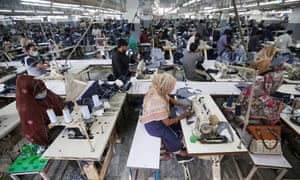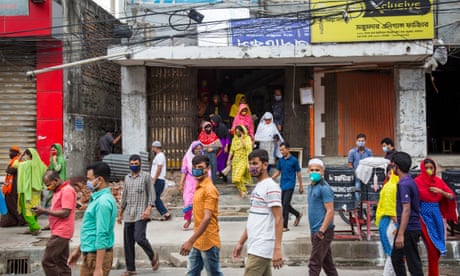Fast fashion: Pakistan garment workers fight for rights amid Covid-19 crisis
Protesters demand wages at factory supplying global fashion brands, as coronavirus leads to layoffs in textile industry
Supported by
 About this content
About this contentSabrina Toppa in Lahore
Wed 27 May 2020

Workers at a garments factory in Karachi. The textile industry is the largest manufacturing industry in Pakistan. Photograph: Shahzaib Akber/EPA
Police in Karachi last week allegedly shot at hundreds of unarmed garment workers protesting outside a factory supplying denim for global fashion brands.
Garment workers such as Abdul Basit, 35, claimed to have been charged by police with batons outside a factory which is reported to have fired more than 15,000 workers since the start of the coronavirus pandemic, according to Nasir Mansoor from the National Trade Union Federation. He said some workers had been terminated without written notice.
The workers were chanting slogans demanding better conditions and wages when police arrived. Closures and job losses and the suspension of the normal holiday bonus, which enables rural migrants to travel home before the Eid holiday marking the end of Ramadan, had left many of the demonstrators close to despair.
Basit, 35, who works at the factory where the protests took place, told the Guardian he hadn’t been paid since March. “We’re insecure workers and we can be fired at any time,” he said.

Bangladesh garment factories reopen despite coronavirus threat to workers
https://www.theguardian.com/global-development/2020/may/11/bangladesh-garment-factories-reopen-despite-coronavirus-threat-to-workers
Police in Karachi last week allegedly shot at hundreds of unarmed garment workers protesting outside a factory supplying denim for global fashion brands.
Garment workers such as Abdul Basit, 35, claimed to have been charged by police with batons outside a factory which is reported to have fired more than 15,000 workers since the start of the coronavirus pandemic, according to Nasir Mansoor from the National Trade Union Federation. He said some workers had been terminated without written notice.
The workers were chanting slogans demanding better conditions and wages when police arrived. Closures and job losses and the suspension of the normal holiday bonus, which enables rural migrants to travel home before the Eid holiday marking the end of Ramadan, had left many of the demonstrators close to despair.
Basit, 35, who works at the factory where the protests took place, told the Guardian he hadn’t been paid since March. “We’re insecure workers and we can be fired at any time,” he said.

Bangladesh garment factories reopen despite coronavirus threat to workers
https://www.theguardian.com/global-development/2020/may/11/bangladesh-garment-factories-reopen-despite-coronavirus-threat-to-workers
Like many workers, Basit doesn’t have a direct contract with the factory, leaving him vulnerable. He helps support a family of seven on his salary of 17,500 rupees (£89) a month, but this Eid he was unable to celebrate with them in Larkana, his hometown, a six-hour journey away. “The price of transportation has gone up, and I am living hand to mouth,” Basit said.
Across Pakistan, thousands of garment workers are battling against forced layoffs and months of unpaid salaries, as the deepening economic crisis caused by Covid-19 hits workers’ ability to support their families in the world’s fifth most populous country. The textile and apparel industry is Pakistan’s second largest employer after agriculture. Nearly 9% of Pakistan’s GDP – and almost 70% of the country’s exports – comes from the industry.
“Most of the textile factory owners are using the coronavirus crisis to lay off workers,” said the labour activist Farooq Tariq. “The crisis was already going on, but the pandemic has only accelerated it.”
In March, Prime Minister Imran Khan urged companies not to fire workers during the lockdown, stressing that millions of labourers were at higher risk of dying from hunger than from Covid-19. Sindh province issued directives prohibiting worker layoffs and creating an emergency fund for labourers.
The pandemic has wreaked havoc on textile exports, which are mostly sent to the US, China, the UK and Germany.
Factory production has slowed dramatically across the country, with global fashion brands reducing or eliminating orders. This has precipitated a devastating crisis for Pakistani suppliers, who are passing the impact along to those least able to weather it: labourers living on meagre wages, campaigners say.
In Lahore, hundreds of garment workers were reported to have organised a strike last week against the non-payment of salaries at multiple factories and activists claim factory owners are treating workers as expendable commodities. Last year, Human Rights Watch censured Pakistan’s garment factories for rampant labour violations, including failing to pay the minimum wage, forcing hours of unpaid overtime, and neglecting to provide medical leave or adequate breaks to workers.
Mansoor said it had been easy for factories to implement forced dismissals because 85% of workers lack a contract: “The factories just tell the gatekeeper: ‘Don’t let this person in,’ and that’s how they know they’re fired,” he said. Few workers have the resources to pursue cases in labour courts.
“They were carrying out these violations before, but it was underground,” said Tariq. “The labour law violations have been exposed more openly during this crisis.”
Across Pakistan, thousands of garment workers are battling against forced layoffs and months of unpaid salaries, as the deepening economic crisis caused by Covid-19 hits workers’ ability to support their families in the world’s fifth most populous country. The textile and apparel industry is Pakistan’s second largest employer after agriculture. Nearly 9% of Pakistan’s GDP – and almost 70% of the country’s exports – comes from the industry.
“Most of the textile factory owners are using the coronavirus crisis to lay off workers,” said the labour activist Farooq Tariq. “The crisis was already going on, but the pandemic has only accelerated it.”
In March, Prime Minister Imran Khan urged companies not to fire workers during the lockdown, stressing that millions of labourers were at higher risk of dying from hunger than from Covid-19. Sindh province issued directives prohibiting worker layoffs and creating an emergency fund for labourers.
The pandemic has wreaked havoc on textile exports, which are mostly sent to the US, China, the UK and Germany.
Factory production has slowed dramatically across the country, with global fashion brands reducing or eliminating orders. This has precipitated a devastating crisis for Pakistani suppliers, who are passing the impact along to those least able to weather it: labourers living on meagre wages, campaigners say.
In Lahore, hundreds of garment workers were reported to have organised a strike last week against the non-payment of salaries at multiple factories and activists claim factory owners are treating workers as expendable commodities. Last year, Human Rights Watch censured Pakistan’s garment factories for rampant labour violations, including failing to pay the minimum wage, forcing hours of unpaid overtime, and neglecting to provide medical leave or adequate breaks to workers.
Mansoor said it had been easy for factories to implement forced dismissals because 85% of workers lack a contract: “The factories just tell the gatekeeper: ‘Don’t let this person in,’ and that’s how they know they’re fired,” he said. Few workers have the resources to pursue cases in labour courts.
“They were carrying out these violations before, but it was underground,” said Tariq. “The labour law violations have been exposed more openly during this crisis.”
No comments:
Post a Comment